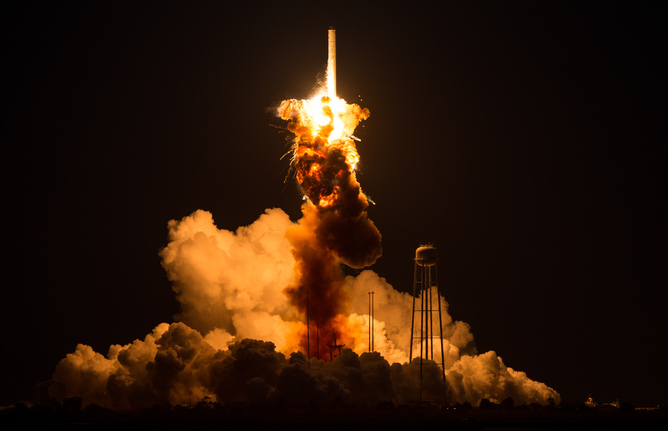
An Unmanned Rocket Exploded — So What?

This article was originally published on The Conversation. The publication contributed this article to Space.com's Expert Voices: Op-Ed & Insights.
Sputnik was launched more than 50 years ago. Since then we have seen missions launched to Mercury, Mars and to all the planets within the solar system. We have sent a dozen men to the moon and many more to the International Space Station, along with a significant complement of female astronauts. Our communications, banking, television, security and transport sectors rely on satellites orbiting the Earth.
We have moved from a space race between nations to becoming a race that relies on space for many of its everyday activities. Perhaps this is why the explosion on take-off of the unmanned Antares launch vehicle has received such wide publicity.
The rocket was not carrying anything irreplaceable: it was a scheduled cargo mission, taking supplies to the International Space Station (ISS). Indeed, a Russian vehicle was launched soon after with a similar cargo, so the astronauts will not be in danger of going hungry. But, as with any accident, results from the explosion will have ramifications beyond the immediate issue of re-supplying the ISS.
So why is this launch failure so significant? One reason may be that the rocket was owned by a private company, Orbital Sciences Corporation. It is one of the two companies (the other being SpaceX) contracted by NASA to resupply the ISS following the end of the space-shuttle programme.
Orbital Sciences Corporation has a proud record of successful satellite launches, but this was only its second rocket to the ISS and third launch of their Antares medium-class launch vehicle. It is probably unfortunate that the company website states that Antares is designed to have a 95% (or greater) launch reliability.
Even if the accident investigation rapidly identifies the reason for the explosion, the time it will take to re-build the launch pad and ensure that the fault is fixed will delay Orbital Science’s space ambitions. The price of shares in the company dropped by about 15% after the launch failure.
Get the Space.com Newsletter
Breaking space news, the latest updates on rocket launches, skywatching events and more!
All private companies launching rockets into space will be affected. It is somewhat ironic that, although there have been enormous advances in space technology in terms of the instrumentation and equipment that is launched into space, the computer systems that control them and the basic mechanism of getting into space have not advanced much. Launch still relies on a controlled explosion, either from a liquid or a solid propellant. In other words, we are still mounting delicate things on top of a bomb.
Does this give confidence, as we become ever more dependent on orbiting satellites, and the promise of space tourism moves closer to reality? While there has been progress on most aspects of space flight, it seems that the very first stage, getting there, remains the most hazardous. The Challenger disaster of 1986, when the space shuttle broke up during its launch, killing all seven of the astronauts, is a constant reminder of the dangers of space transport.
Up until the end of 2013, a total of 6,584 spacecraft had been launched, with 549 failures, a success rate of about 92%. The current generation of launchers is becoming increasingly reliable: success rates of 98.7% for the US Delta II launch vehicle, 97.1% for the Russian Soyuz launcher, and 94.6% for Europe’s Ariane 5.
We are now in the position where airline transport was a century ago: warily regarding something that is generally safe, but which achieves notoriety when it goes wrong. In 2013, there were 29 fatal air accidents, the lowest figure in post-war history. This corresponds to less than one incident per million aircraft take-offs. We rarely consider the chances of an aircraft accident – maybe when we are instructed to pay attention to the safety demonstration, a vague shadow of disquiet passes over us, only to have been forgotten by the time the plane actually takes off.
Eventually space transportation will be regarded in the same way. But until then, we are a species that relies on space, even if we have not yet fully conquered it.
Monica Grady does not work for, consult to, own shares in or receive funding from any company or organisation that would benefit from this article, and has no relevant affiliations.
This article was originally published on The Conversation. Read the original article. Follow all of the Expert Voices issues and debates — and become part of the discussion — on Facebook, Twitter and Google +. The views expressed are those of the author and do not necessarily reflect the views of the publisher. This version of the article was originally published on Space.com.
Join our Space Forums to keep talking space on the latest missions, night sky and more! And if you have a news tip, correction or comment, let us know at: community@space.com.









